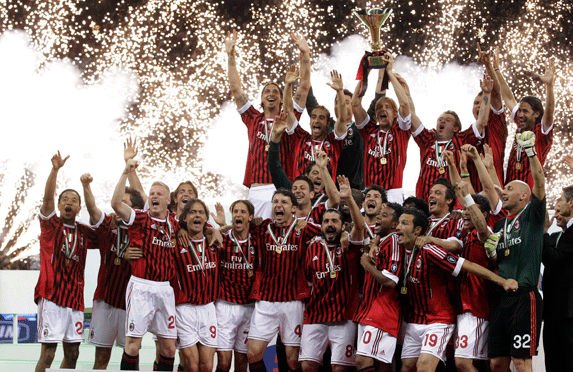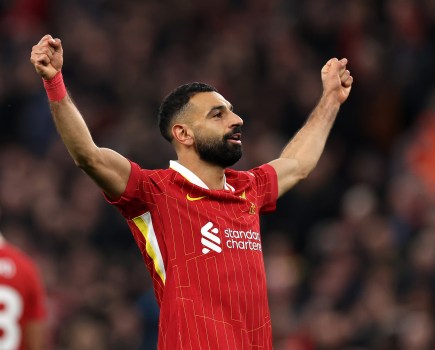The front page of Italy’s leading sports daily, Gazzetta Dello Sport, recently carried a little joke about Roma idol Francesco Totti.
In an interview the previous day, Franco Baldini, the right-hand man of England boss Fabio Capello, had spoken enthusiastically of England’s greatest bard, namely Shakespeare. In the joke, Totti is asked to comment: “Shakespeare?” replies the 34-year-old. “No, no thanks, we’re all settled up front,
we don’t need anyone else.”
As we set off for the new season, it is again a case of rounding up a number of the usual suspects in the shape of polemics, a betting scandal and hardy annuals such as Totti and Juve’s Alessandro Del Piero. One new element in the Italian firmament this season, however, will be an American-owned Roma for which Baldini has been recruited as an experienced guide. As he assesses his return to an Italian football world he left six years ago, Baldini underlines some uncomfortable home truths about the contemporary Italian scene.
“Why should anyone invest in Italian football?” he has asked. “The bureaucracy is huge and slow, legality is questionable, and there is always a huge confusion about what you can and cannot do, we never offer sure answers only uncertainty.
“The worst thing about our football is that even though it makes money it has still got poorer. Italian football didn’t know how to handle its money and now, in this climate of global crisis, it is all the more in trouble.”
The climate of uncertainty alluded to by Baldini is exemplified perfectly by the preparations of the reigning champions, Milan, Italy’s most successful side in European competition. As so often, events that have little or nothing to do with football may well yet impinge upon the club owned by prime minister Silvio Berlusconi.
In early July, the embattled PM received one of a number of recent setbacks when a Milan appeals court ruled that his family holding company, Fininvest, should pay a compensation settlement of ¤560million to the
CIR conglomerate in the so-called “Mondadori” case. Furthermore, this being an appeal hearing, Fininvest now have to pay, cash up front.
This, in turn, has led to widespread speculation that Milan, which forms part of the Fininvest group, could
yet be affected, given that monies destined for the transfer market will now clearly be put to another use. The Berlusconi family are reported to be considering a variety of options, including floating the club on the stock exchange to raise capital or selling a minority shareholding to wealthy investors, perhaps of the Middle Eastern kind.
Milan, of course, like most Italian clubs is run at a loss. In 2010, the club ended the year ¤69m in the red. A recent study by the Football Federation suggests that between 2007 and 2010, the overall debts of Serie A, Serie B and Lega Pro (third and fourth division) clubs rose from ¤2.2billion to ¤2.9bn. Furthermore, Italian clubs manage to earn from sponsors, merchandising and other commercial activities roughly half the sums earned by Premier League and Bundesliga teams. On top of that, Serie A and Serie B clubs currently owe an estimated ¤300m to the revenue commissioners.
So then, against the background of a financial crisis, an ongoing betting scandal and following a year of total ignominy in European competition, what can we expect of Italian football on the field this season? Answer: a league dominated by Inter, Juventus and Milan and further probable failure in European competition.
As reigning champions Milan deserve to start favourites but many observers would argue that it is their city cousins, Internazionale, who remain the strongest side in the land, despite a disappointing 2010-2011 season in which they appeared to pay the physical and mental price for their treble success the previous year.
As for Juventus, their most significant change this summer may well concern the role of coach, with former Juve player, Antonio Conte, who was highly successful with both Bari and Siena in Serie B, taking over from Gigi Delneri. Another important move may also be that of 33-year-old Italy and Milan idol Andrea Pirlo on a free, with a three-year contract worth ¤3m per annum, who seems set to become a key figure for a side in which he will be expected to supply the goods for a possible four-man attack of Milos Krasic, Del Piero (or Vincenzo Iaquinta), Alessandro Matri and Fabio Quagliarella.
One of the key questions regarding the new season concerns Napoli and Udinese who could both find Champions League football represents a costly distraction. For Udinese, too, the jury is out, but the loss of Alexis Sanchez to Barcelona will hurt.
Which leaves us with Roma and Lazio. All the initial indications of the new US-funded era at Roma are that the “project” may take some time, not only for the new management to assemble a strong squad but also for the existing one to assimilate the ideas of new Spanish coach Luis Enrique. In the meantime, what do they do with Totti? Will there be space for him? Will he have an important role in the new team?
As for Lazio, notwithstanding the purchases of strikers, Miroslav Klose from Bayern Munich and Djibril
Cisse from Panathinaikos, as well as goalkeeper Federcio Marchetti, they look like they will have a tough job matching their excellent performance last season when they came painfully close to qualifying for the Champions League. Coach Edy Reja will have to work wonders with a squad that will probably see the departure of the enigmatic, but talented Argentinian striker Mauro Zarate.
As for the rest, they can be divided into three groups. Firstly, there are the newly promoted trio of Atalanta, Novara and Siena – even if there is the risk that Atalanta could yet find themselves back in Serie B (or lower) in the wake of the alleged involvement of Cristiano Doni in the betting scandal.
Siena – coached last season by Conte, who is now replaced by Giuseppe Sannino – appear to be clear of the betting problems, while Novara represent a genuine feel-good story in that they are back in Serie A after 55 years, having risen from the third division in two seasons. These three will probably join Cagliari, Catania, Cesena, Lecce – and perhaps Parma – in a long battle against relegation.
In the second group are teams such as Bologna, Chievo and Genoa who are probably good for a safe, mid-table finish, while the third group comprises only Fiorentina and Palermo as teams that could cause problems for the big guns. Featuring the welcome return from injury of Montenegrin ace Stevan Jovetic, as well as Alberto Gilardino up front, Riccardo Montolivo and Peru’s Juan Vargas in midfield, Fiorentina, still coached by Sinisa Mihajlovic, look competitive.
Palermo’s season is harder to predict, given that Argentinian midfielder Javier Pastore, arguably their most inspirational figure, is seemingly on his way elsewhere.
With Josip Illic and Fabrizio Miccoli in attack, and a battling midfield of Federico Balzaretti, Antonio Nocerino, Giulio Migliaccio and Mattia Cassani, Palermo under new coach Stefano Pioli will be another hard nut to crack, especially in Sicily.
By Paddy Agnew
Key dates:
Season starts: August 28, 2011
Season ends: May 13, 2012







